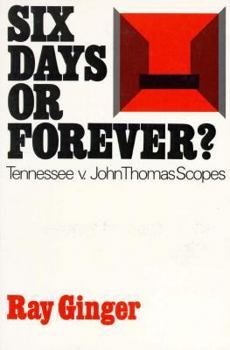Six Days or Forever?: Tennessee V. John Thomas Scopes
Select Format
Select Condition 
Book Overview
272 pages. This description may be from another edition of this product.
Format:Paperback
Language:English
ISBN:0195197844
ISBN13:9780195197846
Release Date:September 1974
Publisher:Oxford University Press
Length:272 Pages
Weight:0.62 lbs.
Dimensions:0.6" x 5.4" x 8.0"
Customer Reviews
2 ratings
The first critical account of the Scopes "Monkey" Trial
Published by Thriftbooks.com User , 22 years ago
In the conclusion to "Six Days or Forever?" Ray Ginger identifies two purposes for writing his account of the Scopes trial. First, getting "the facts straight," in order to correct "many mistakes in previous accounts of the episode," believing his book "comes much closer than do those accounts to telling what actually occurred." Second, Ginger "tried to view the Scopes trial in the broadest possible context." The book was published in 1958, when interest in the Monkey Trial was revitalized by the success on Broadway of the play "Inherit the Wind."Ginger's primary reference sources were the published stenographic transcript and Leslie H. Allen's edited version, along with the scrapbook files on the case of the A.C.L.U. and Kirtley F. Mather. Ginger made use of the available biographies of several participants as well as full-length studies of Fundamentalism and antievolution, histories of Tennessee, official records of the Scopes appeal, and books on various scientific and religious topics. Ginger also acknowledged several participants who shared their memories in interviews or through correspondence. Finally, in the interest of factual accuracy, Scopes himself read portions of the manuscript.Ginger prefaces the trial with a quotation from Andre Gide on how Christian orthodoxy either absorbs or rejects any other truth, which clearly indicates Ginger's perspective on what happened in Dayton, Tennessee in the summer of 1925. The passage of the Butler Act and the other developments leading to the trial are detailed in "Law as Symbolic Action." William Jennings Bryan is considered in "Hot Rod Halidon" while Clarence Darrow is presented as "As Uncurried Mind." The trial is covered in five chapters each with an insightful title, with the chapter of Darrow's cross-examination of Bryan called "The Stillborn Miracle." Ginger's most significant rhetorical aspect is his criticism of both Bryan and Darrow. Calling Bryan's undelivered speech "no mere lallation," Ginger wonders what Bryan hoped to accomplish in Dayton with "a supposed summation to a jury, begun long before he had heard the evidence or investigated the law, and disposing of those topics hastily." Ginger labels Darrow "Almost an anarchist," who "was certain of nothing," a position leading to a paradoxical mix of "skepticism and curiosity." Reminding readers that Darrow had repeatedly dismissed colleges as being worse than useless because "they destroyed compassion without imparting wisdom," Ginger actually forges a common ground between the extreme positions of the literalist Bryan and the agnostic Darrow. Although Darrow was more realistic and more democratic than his critics, Ginger faults the attorney for having ignored the majority. However, in the end Ginger must credit Darrow with providing ridicule as a major weapon against the fundamentalists.At the end of "Six Days or Forever?" Ginger tries to maintain a balance between Bryan and Darrow and ends up advocating reading the Bi
Solid narrative history
Published by Thriftbooks.com User , 25 years ago
This book does an excellent job of placing the Scopes trial within the context of long standing currents in American culture. The progressive/conservative and scientific/fundamentalist tensions have long been present. The book places the evolution debate in context with the social currents that drove abolition, women's suffrage, and prohibition. It helps us understand the social and historical context of the modern Christian Coalition, and more radical ideologies like the Christian Identity movement.This book changed the Scopes trial from something in "history," and thus far removed and abstracted from my everyday life, to something that might have affected my Grandfather, something that might have happened to people I know. Something that, given the recent decision of the Kansas Board of Eduction to drop evolution as a requirement for an accedited science cirriculum, could happen to my own children.The book is choppy in places, with momentary digressions into detail that do seem to distract from the main point, but I'm not about to suggest I could have done better. I recommend this book.






